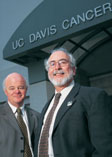 
NCI
Designation Achieved
Michael Reese Hospital and Medical Center on the South Side of Chicago
some 12 years ago, a spreadsheet of prostate cancer data on the
table before him. The spreadsheet laid out vital statistics, including
ethnicity and PSA test results, for the 100 or so men treated for
prostate cancer at the hospital over the previous two years. It
seemed to Vijayakumar, as he scanned the spreadsheet, that PSA levels
were consistently higher in the African-American patients.
Vijayakumar, then a professor of radiation and cellular oncology
at the University of Chicago, was intrigued. The PSA, a blood test
used to detect prostate cancer, was relatively new at the time;
no ethnic variations in the test had ever been reported.
“I ran to the physics room and pulled out a calculator,”
he recalls. The calculator quickly confirmed his suspicion. The
average PSA for the African-American men on the spreadsheet was
two times that of the Caucasian men.
That conference-room observation became the basis of a 1992 article
by Vijayakumar in the journal Cancer Epidemiology Biomarkers &
Prevention; it was the first scientific paper to report on racial
differences in PSA levels among men with prostate cancer. The observation
also sparked Vijayakumar’s career-long interest in understanding
and eliminating ethnic disparities in cancer, a research focus he
carried with him to UC Davis.
One of the nation’s lead- ing radiation oncologists, Vijayakumar
joined UC Davis Cancer Center as professor and chair of the Department
of Radiation Oncology late last year. He also serves as medical
director of the cancer center’s two regional affiliates, Mercy
Cancer Center in Merced and Fremont-Rideout Cancer Center in Marysville.
Passion for prevention
Radiation oncologists, extensively trained in the safe use of radiation
to treat cancer, typically are not involved in population and prevention
studies.
But Vijayakumar is not a typical radiation oncologist. He was the
only radiation oncologist among the more than 90 principal investigators
in the Prostate Cancer Prevention Trial. A national trial with nearly
19,000 men participating, the PCPT seeks to determine whether the
drug finasteride can prevent prostate cancer.
Vijayakumar was also the lone radiation oncologist tapped as a principal
investigator for the African-American Hereditary Prostate Cancer
Study, a national effort to gather blood samples from black men
with family histories of the disease in hopes of identifying responsible
genes.
Vijayakumar’s newest research project also focuses on prevention.
Funded by the U.S. Department of Defense Prostate Cancer Research
Program, the new study will assess whether vitamin D can prevent
cancer recurrences in men who have completed radiation therapy for
prostate cancer.
A way to prevent prostate cancer may be a long way off. But Vijayakumar
thinks methods of postponing prostate cancer — keeping it
at bay for five or 10 years — may be within reach.
“Postponing prostate cancer could have a real impact,”
he says. “If we could delay the average age that a man gets
prostate cancer, from age 67 to age 77, that would be a good thing.”
A
primary care background
Trained
on three continents, Vijayakumar earned his medical degree at SV
University in Tirupati, India, and completed his surgical and radiation
oncology training at the University of Madras in Madras, India.
He completed a second residency in radiation oncology at Michael
Reese Hospital and Medical Center, where he was chief resident for
two years. He received additional training in brachytherapy, also
known as radioactive seed implant therapy, in France.
Vijayakumar traces his prevention focus to his years as an oncology
resident in India. Medical residents were paid 300 rupees a month,
or about $30, roughly half the income a single person needed to
live. To make ends meet, Vijayakumar ran a 24-hour primary care
clinic, charging impoverished patients three rupees a visit, or
about 30 cents, and wealthy patients about 100 rupees. He hired
another physician to staff the clinic during the day, staffing it
himself nights and weekends — stitching up knife wounds, tending
to patients with tuberculosis, and making house calls to care for
typhoid patients. “That background,” he says, “made
me see the value of prevention.”
Upon arriving in the United States, the young doctor who once overcharged
his rich patients to subsidize the poor ones was dismayed to find
that social disparities in health care also existed here.
African-American men are diagnosed with prostate cancer at more
advanced stages of the disease than white men, and are twice as
likely to die of the disease.
For Vijayakumar, a focus on prostate cancer — preventing it,
and finding out why black men suffer disproportionately from it
-— came naturally.
Soon after settling in Chicago, he began visiting African-American
churches on the city’s South Side on Sundays, preaching prostate
cancer awareness and early detection. During the week, when he wasn’t
treating patients or teaching medicine, he pursued his prostate
cancer population and prevention research, along with more traditional
radiation oncology studies. Over the past decade, Vijayakumar has
published more than a dozen scientific articles on prostate cancer
and race.
“Why is the incidence of prostate cancer higher among African-American
men? Why is the overall outcome poorer in African-American prostate
cancer patients? These are open questions,” Vijayakumar says.
“We have to answer them.”
  

Home |
Table of Contents |
To our Readers |
Building on Basics
Focusing on Patients |
In Translation |
First Steps
Campus Connection |
Benefactors |
News in Brief
UC Davis Health System |
© 2000, 2001, 2002 UC Regents. All rights reserved.
|
 |



 

African-
American men are diagnosed with prostate cancer at more advanced
stages of the disease than white men, and are twice more likely
to die of the disease.
|


